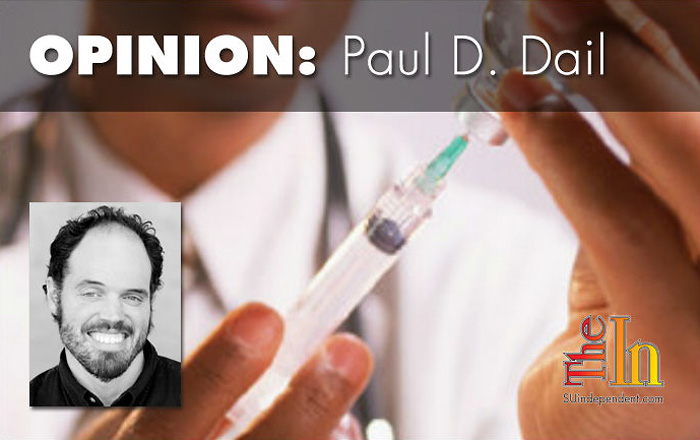
Written by Paul Dail
In my former life as a high school English teacher, I taught a unit on dystopian literature, stories about societies that try to create a utopia but typically fail miserably by most rational standards. In one of these stories, when an adolescent girl discovers the reality of her situation and the state of her world, she chooses to kill herself.
Some of you may already know the story to which I’m referring, but for the rest of you, all you need to know is this society essentially chose safety over most forms of personal freedom. The girl’s choice to kill herself was not only taking a stand against the status quo, but it was also her exercising the only freedom she had over her life. Namely, that of her death.
Once again, art imitates life, and vice-versa. Brittany Maynard, the woman with terminal brain cancer who recently moved to Oregon so she could end her life, may have passed away—along with her moment in the media spotlight—but her struggle wasn’t the first, and it seems it won’t be the last.
This isn’t an issue to be forgotten like any other passing news trend. In my opinion, it’s bigger than the right to death with dignity; it’s about our freedom to live or die as we choose, so long as it isn’t a detriment to someone else. When it comes to dying, defining that last part gets tricky.
And personal.
And you don’t have a lot of choices. Oregon is one of three states, including Washington and Vermont, which currently permits someone to choose the timing and manner of their own death. Of those three, Oregon’s Death with Dignity law has been around the longest. At least six other states have current legislation under consideration, and the New Jersey Assembly recently passed their own version of a Death with Dignity act which will now move to the Senate.
The Oregon Death with Dignity Act was fully enacted at the end of 1997. Here are some interesting numbers per a report from the Oregon Health Authority:
· In almost 17 years, 1,173 people have had their deaths medically prescribed to them, most of whom were cancer patients.
· 752 of these have actually taken the drugs to facilitate their deaths, averaging about 44 medically-assisted suicides per year.
· The average was a little higher last year. In 2013, 122 people were prescribed end-of-life drugs, with 71 of them using the drugs. The majority of the others died of natural causes.
When the news reported Brittany Maynard’s decision to move to Oregon so she could end her own life, the Roman Catholic Church publicly condemned her decision. For the Catholics, even if in you’re in tremendous pain, suicide is a mortal sin. You just don’t do it. But while other churches may not have been as public, I can only assume many agreed.
And who can really blame the religious for thinking this way? Besides the whole sinning thing, the Bible—if one chooses to take all of it literally—is chock full of people going through some seriously crazier stuff than a large majority of people who consider suicide these days. The Bible says, “Suck it up. It’s a test from God.”
But even if you’re not religious, many people consider suicide just plain selfish. Even in a world where we are starting to understand that certain mental illnesses and forms of depression are chemical imbalances that people can’t control, we still look down on suicide. If for no other reason, because it hurts other people who are left behind.
A friend of mine committed suicide this last year, and after going through the range of emotions, what I was left with was a sense of relief that he had found peace but also residual anger that he had chosen to do it. Life is something you fight for.
According to an article in Medical Daily, there are some doctors who apparently subscribe to a similar philosophy, which also makes sense seeing as their whole life is committed to keeping people alive.
Well, except for Dr. Kevorkian. Yeah, remember Dr. Death who claimed to have helped at least 130 people die and was ultimately convicted of a second degree murder for helping a terminally ill man end his life?
Anyway, Maynard, described as a normally vibrant and active woman, believed that death with dignity meant she wouldn’t have to endure the final days of pain, suffering, and wasting away of a body and mind which had served her so well for the first 29 years of her life.
However, the physicians arguing against Maynard’s decision—and death with dignity in general—believe that life isn’t just about youth and beauty and independence. Per the Medical Daily article: “Life itself was dignity, they claimed, even if it meant becoming deteriorated, old, and dependent.”
Basically, it’s selfish.
Hmm. I wonder.
Every year before my students would read “The Tragedy of Romeo and Juliet,” I led a discussion about suicide. Most kids had either considered it themselves or knew someone who had, so I was always careful to try and see both sides of the issue.
Kids have some wisdom, even if it’s sometimes hidden from themselves. I don’t remember the exact comment a student made my last year teaching, but I suddenly realized that while it may be selfish of someone to kill themselves, it could also be just as selfish of us to expect that person to stick around on our behalf. In some instances, it might even make things worse.
I had my own run in with cancer this year. In the month and a half between finding out, having my left kidney removed, and getting the final pathology, I had a lot of time to think about what my life would look like if I couldn’t beat this thing, and I will admit that suicide came into my mind.
While I would have wanted to spend as much time with my family as possible, I didn’t want my children to see me die, for their last memories of me to be in a hospital. When it comes to a question of selfishness, wouldn’t it have been actually selfish of me to want to die naturally while my children watched?
Previous to my experience with kidney cancer but subsequent to turning 40, I developed my own personal credo, according to the religion of Paul…Dail, that is. Not the apostle. I had decided that life was going to have to kill me. Not that my life had been that difficult yet. I recognized I had been relatively fortunate up to that point. But even given this credo, beyond perhaps a little residual anger, I wasn’t going to condemn someone who chose to end their life.
Being faced with cancer may have temporarily changed my credo, but I don’t think it changed my mind. I’m still not going to say that it’s wrong.
It’s not about regretting the loss of my youth or beauty as some doctors might suggest (I was never that good looking to begin with). It’s bigger than that. It’s about choosing the life you want to live, even if it means choosing not to live with death looming over your shoulder. You choose to turn around and face him instead.
If it’s not about religion, if we’ve settled our debts and scores and said our final goodbyes, isn’t it more selfish of someone else to want us to stick around through the pain?
If it is about religion, we should be free to choose how we’re going to meet—or not meet—God.
This should be my decision to make, even if I never choose to make it.
As always, I would love to hear your thoughts or comments. For the first two weeks following publication of each of my columns, I personally respond to each comment within 48 hours.
Paul D. Dail received his BFA in English with a Creative Writing emphasis from the University of Montana, Missoula. In addition to freelance journalism and web content creation, he also enjoys writing creative nonfiction and fiction (with a penchant for the darker side of the page). His collection of flash fiction, “Free Five,” has spent over a year and a half in the top 50 Kindle Horror Shorts Stories since its publication in 2012. Currently he lives on the outskirts of Kanarraville, surrounded by the sagebrush and pinyon junipers, with his wife and two children.
Follow The Independent: Facebook Google+ Twitter Instagram Tumblr



